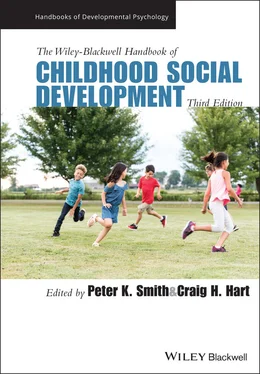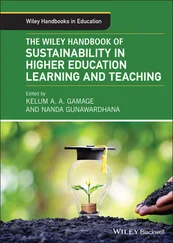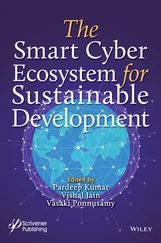1 Cover
2 Series Page Wiley‐Blackwell Handbooks of Developmental Psychology This outstanding series of handbooks provides a cutting‐edge overview of classic research, current research, and future trends in developmental psychology. Each handbook draws together 25–50 newly commissioned chapters to provide a comprehensive overview of a sub‐discipline of developmental psychology. The international team of contributors to each handbook has been specially chosen for its expertise and knowledge of each field. Each handbook is introduced and contextualized by leading figures in the field, lending coherence and authority to each volume. The Wiley‐Blackwell Handbooks of Developmental Psychology will provide an invaluable overview for advanced students of developmental psychology and for researchers as an authoritative definition of their chosen field. Published Blackwell Handbook of Adolescence Edited by Gerald R. Adams and Michael D. Berzonsky The Science of Reading: A Handbook Edited by Margaret J. Snowling and Charles Hulme Blackwell Handbook of Early Childhood Development Edited by Kathleen McCartney and Deborah A. Phillips Blackwell Handbook of Language Development Edited by Erika Hoff and Marilyn Shatz The Wiley‐Blackwell Handbook of Childhood Cognitive Development, 2nd edition Edited by Usha Goswami The Wiley‐Blackwell Handbook of Adulthood and Aging Edited by Susan Krauss Whitbourne and Martin Sliwinski The Wiley‐Blackwell Handbook of Infant Development, 2nd Edition Edited by Gavin Bremner and Theodore D. Wachs The Handbook of Early Childhood Development Programs, Practices, and Policies Edited by Elizabeth Votruba‐Drzal and Eric Dearing The Wiley Handbook of Developmental Psychology in Practice: Implementation and Impact Edited by Kevin Durkin and H. Rudolph Schaffer The Wiley Handbook of Group Processes in Children and Adolescents Edited by Adam Rutland, Drew Nesdale and Christia Spears Brown The Wiley‐Blackwell Handbook of Childhood Social Development, 3rd Edition Edited by Peter K. Smith and Craig H. Hart
3 Title Page The Wiley‐Blackwell Handbook of Childhood Social Development Third Edition Edited by Peter K. Smith Craig H. Hart
4 Copyright Page
5 About the Editors
6 List of Contributors
7 Introduction
8 PART I: Historical Overview CHAPTER ONE: Conceptual and Empirical Precursors of Contemporary Social Development Research Foundations of the Modern Era Dominant Research Aims and Foci Major Transformations in Social Development Research Summary and Additional Considerations References
9 PART II: Disciplinary Perspectives CHAPTER TWO: Behavioral Genetics The Role of Genetic Factors in Social Development The Role of Environments Factors in Social Development The Role of Gene–environment Interplay in Social Development Possible Implications of Behavioral Genetic Research References CHAPTER THREE: The Brain and Social Development in Childhood Brain Development by the Numbers The Developing Brain and Neuroimaging Social Brain Networks Determined from Lesion Analysis Studies Quantitative Neuroimaging, Network Neuroscience, and Social Brain Development Identifying Social Brain Networks and their Role in Social Functioning Adverse Effects, Injury, and Development of the Social Brain Conclusions References CHAPTER FOUR: Evolutionary Perspectives on Social Development Darwin’s Disciples–G. Stanley Hall, John Bowlby, and Mary Ainsworth Building on Bowlby–The Development of Evolutionary Psychology Jay Belsky–Integrating Life History Theory into Developmental Psychology Del Giudice and “Switch Point” Transitions in Development Do Parents Matter? Judith Rich Harris and the Nurture Assumption The Development of Social Cognition: Michael Tomasello and the Importance of Social Cognition Where Are We Now? David Geary and David Bjorklund Formulating Evolutionary Developmental Psychology in the 21st Century Present Concerns and Future Developments: Cultural Editing References CHAPTER FIVE: Historical Developmental Psychology: Changing Conceptions of Child Development Enlightenment Rousseau’s Émile The Émile and Community Schooling Progress in Enlightenment and Romanticism Child Development in Enlightenment and Romanticism Infantilization according to Ariès The Disappearance of Childhood New Possibilities? Acknowledgement References CHAPTER SIX: A Sociological Perspective on Social Development Child Socialization through Social Change The Politicization of Parenting and Child Socialization Intensive Parenting and the Making of the “Responsible” Parent School and Parent Partnerships: Vehicles for Socialization? Public Space, Play, and Child Socialization Inequality, Social Class, and Child Socialization Inequality and Child Well‐being Final Thoughts References CHAPTER SEVEN: Anthropological Perspectives on Social Development Anthropology, Child Development, and Cross‐Cultural Studies of Childrearing The New Social Studies of Childhood and “Child‐Centered” Anthropology Anthropology and Social Development in the 21st Century – Tentative Steps Towards Dialogue Conclusion References
10 PART III: Ecological Contexts CHAPTER EIGHT: Ecological Perspectives and Social Development Introduction to Ecological Perspectives How Ecological Perspectives can be used to Understand Social Development Implications for Research and Intervention Conclusion References CHAPTER NINE: The Physical Environment and Social Development Aspects of the Physical Environment Noise Crowding Chaos and Instability Limitations and Future Directions References CHAPTER TEN: Conflict, War, and Famine in Childhood: Risks and Resilience for Social Development Interplay among War, Environmental Crisis, and Famine Conflict’s Impact on Child Health Impacts of Exposure to War, Armed Conflict, and Famine on Social Development Cumulative Risk and Adversity Resilience in the Context of Humanitarian Disasters Strategies for Promoting Optimal Health and Social Development Conclusion References CHAPTER ELEVEN: Impact of the Climate Crisis on Children’s Social Development The Threat Posed by the Climate Crisis to This Generation of Children Impacts of Climate‐Related Disasters on Children’s Social Development Children’s Reactions to Knowledge of Climate Change Building Children’s Capacity to Respond to the Climate Crisis Preparing Children for the Changes Ahead Conclusions and Future Directions References CHAPTER TWELVE: Covid‐19 and Children’s Social Development: Insights from the Life‐Course Perspective Life‐Course Theory as a Lens for Understanding Social Development during the Covid‐19 Pandemic Covid‐19 and the Significance of Social and Economic Stratification Covid‐19 and Developmental Trajectories and Turning Points Covid‐19 and Linked Lives Conclusions Acknowledgment References
11 PART IV: Culture and Immigration CHAPTER THIRTEEN: Culture and Children’s Social Development Theoretical Issues and Perspectives Early Socioemotional Characteristics in Cultural Contexts Children’s Social Behaviors across Cultures Culture and Peer Relationships Future Directions References CHAPTER FOURTEEN: The Social Development of Immigrant Children: A Focus on Asian and Latinx Children in the United States Who are Asian and Latinx Immigrants? The Asian and Latinx Traditional Cultural Niches Challenges to Asian and Latinx Immigrant Families and Children Social Development of Asian and Latinx Immigrant Children Asian and Latinx Children’s Social Development During the COVID‐19 Pandemic Conclusions and Future Directions References CHAPTER FIFTEEN: Acculturation and Children’s Social Development in Europe: Recent Theoretical Perspectives and Empirical Findings Developmental Theories of Acculturation Comparisons between Native and Immigrant Children in Europe Acculturation Strategies and Development Future Directions and Conclusions Conclusions References
Читать дальше












